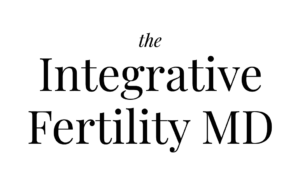Nothing beats getting all your necessary vitamins and minerals from a diet rich in nourishing, whole foods. But unfortunately, it’s just not always possible to achieve this with our modern diets. One day you’ll knock it out of the park with healthy fats, but neglect to eat enough calcium. The next day you cover your calcium and magnesium bases, but hardly get any zinc.
This is the reason you may want to include supplements as a part of your daily life. Though we shouldn’t rely on supplements to give us all the nutrients we need and neglect our eating habits, including some of the best supplements for fertility can help.
Prenatal vitamins
When you’re trying to conceive, one of the most important supplements to include in your routine is a prenatal vitamin. It takes an egg about three months to complete its journey to ovulation. So the nutrients you take in today are actually playing a huge role in healthy egg development and production months down the road!
Not all prenatals are the same, though. Be sure to read labels, and select a prenatal without artificial flavors, dyes, and hydrogenated oils. A lot of supplements on the market are coated with phthalates, which can disrupt your endocrine system in powerful ways.
Look for a prenatal that contains vitamin B12, choline, iron, calcium, selenium, zinc, iodine, and biotin. It should also offer vitamin A, most of which comes from beta carotene. Finally, be sure the brand of prenatal vitamin that you choose contains methylfolate rather than folic acid. Though most prenatals contain folic acid, methylfolate is the more bioavailable, readily-absorbed form. This is especially important if you have an MTHFR (methylenetetrahydrofolate reductase) gene variant.
A lot of the prenatals available at the grocery store contain vitamin D and DHA. These nutrients are both vital during pregnancy and preconception, but prenatals usually contain very little of either of these. Look for separate vitamin D and DHA supplements!
Vitamin D
A vast majority of people in the Western world have low vitamin D levels, despite all the “vitamin D fortified” foods we ingest. This is primarily due to the lack of sunshine that we get, since we spend most of our hours inside. And it’s pretty common for women with PCOS to have very low levels of vitamin D.
Vitamin D is fat-soluble, and it has hormone functionality. It’s actually a vitamin that your body produces in response to sun exposure and foods like eggs, liver, and fatty fish.
It’s incredibly difficult to get enough vitamin D from foods alone. In addition to adding a vitamin D supplement, though, aim to spend at least 20 minutes in direct sunlight every day to encourage vitamin D production. Know your skin type, though, and use caution if you tend to burn easily!
The research surrounding fertility rates and vitamin D levels is a bit mixed. One study concluded that vitamin D deficiency was associated with lower success rates of in-vitro fertilization in non-hispanic White women. But other data don’t show any increase in conception or live birth with vitamin D supplementation.
Levels of vitamin D can be lower due to inflammation, which could possibly be the reason we see lower levels in women with PCOS. Several small studies have suggested that vitamin D supplementation may help regulate the menstrual cycle in PCOS patients. More study is needed in this area, though.
Women with a vitamin D deficiency may also be at increased risk of gestational diabetes, preeclampsia, and premature birth.
There’s some evidence that males who supplement with vitamin D can have improved sperm motility. Higher vitamin D levels were associated with a higher chance of one’s partner conceiving.
Coenzyme Q10
Coenzyme Q10 is a nutrient that naturally occurs in the body. It’s a powerful antioxidant that has been shown to improve ovulation rates in women using Clomid. CoQ10 can also help to support improved egg quality during IVF cycles..
Men taking CoQ10 also showed a possible improvement of sperm concentration and movement.
While we definitely need more human studies on the benefits of CoQ10, it’s considered a safe supplement to take during conception and pregnancy, so most practitioners feel that it is safe and that the possible benefits outweigh the risks.
Myo-Inositol
Myo-inositol is a sugar found in the brain, and it’s part of the group of B-complex vitamins. When studied in women with PCOS, it was shown to decrease insulin resistance and lower levels of serum testosterone. It also improved menstrual irregularities and increased ovulatory frequency!
Pregnancy rates were increased in PCOS patients after they had taken myo-inositol for three to six months. And myo-inositol has also been shown to possibly improve egg quality during IVF. Gestational diabetes levels were also lowered in women who continued supplementing during pregnancy.
Myo-inositol can be a great supplement to consider if you’ve been diagnosed with PCOS!
N-Acetylcysteine
N-acetylcysteine is a great antioxidant to add to your supplement routine to protect your cells from the stress caused by oxidation. Oxidation can reduce the body’s ability to produce a healthy egg, and antioxidants can help fight this oxidative process. This is especially helpful to your egg cells!
N-acetylcysteine can also benefit sperm quality. One study showed that men who took selenium supplements along with N-acetylcysteine demonstrated increased semen quality.
N-acetylcysteine might also benefit women with PCOS by reducing their testosterone and insulin levels. It’s possible that N-acetylcysteine and myo-inositol could be an option for women who can’t tolerate the side effects of Metformin.
Don’t forget to discuss this with your care provider!
When we talk about supplementation, it’s important to remember that each case is different. Your unique history and medical issues may make any of these supplements inadvisable in your case. Be sure to discuss the advisability of adding these supplements to your routine with your fertility doctor.
Dr. Salem is extremely knowledgeable about the benefits and drawbacks of various vitamins and mineral supplements during fertility treatments, conception, and pregnancy. Request a consultation with her to discuss which of these supplements could benefit you!



